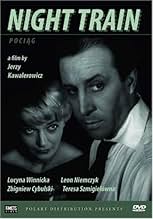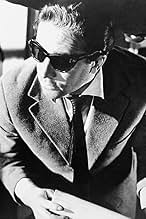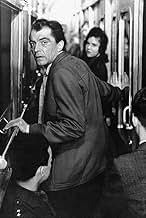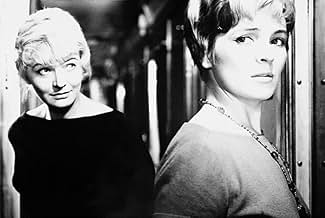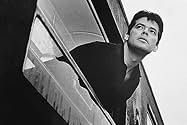Pociag
- 1959
- 1 घं 39 मि
IMDb रेटिंग
7.7/10
3.9 हज़ार
आपकी रेटिंग
अपनी भाषा में प्लॉट जोड़ेंJerzy enters a train set for the Baltic coast. He seems to be on the run from something, as does the strange woman with whom he must share a sleeping compartment.Jerzy enters a train set for the Baltic coast. He seems to be on the run from something, as does the strange woman with whom he must share a sleeping compartment.Jerzy enters a train set for the Baltic coast. He seems to be on the run from something, as does the strange woman with whom he must share a sleeping compartment.
- निर्देशक
- लेखक
- स्टार
- पुरस्कार
- 2 जीत और कुल 1 नामांकन
Andrzej Herder
- Sailor
- (बिना क्रेडिट के)
Barbara Horawianka
- Jerzy's Wife
- (बिना क्रेडिट के)
फ़ीचर्ड समीक्षाएं
This is definitely one of the greatest, and at the same time, one of the most under-appreciated movies in the history of Polish cinema. Jerzy Kawalerowicz is a true master craftsman in the country's film world, and with Night Train he once again proved that this statement is perfectly true. It's a shame that the movie is sometimes cruelly omitted when talking about fine post-war cinema, because it is certainly worth a watch.
Night Train is different from other various Polish movies that came out in the 50's and later, as it doesn't present the social problems that the country had to fight with during the difficult period of Communism.
It reminds me of the movies directed by the Master of Suspense, Sir Alfred Hitchcock, as it contains the recurring themes of murder, suspenseful mystery, the wrongly accused man and a search for the real criminal.
It also reminds me of the great noir movies produced in the United States or Italy throughout the 20th century. It possesses a deeply sombre tone and claustrophobic ambiance created by the particular scenery, in which it takes place - a train. All of this is complemented with an eerie music playing in the background.
Aboard the train, which goes from Lodz to the seaside in Poland, there are many unusual, strangely mysterious, and overly suspicious passengers. One of them is Jerzy, the main character, played brilliantly by Leon Niemczyk. Strolling around in his classy dark glasses he seems like he needs to hide from something or someone. Unfortunately, due to some peculiar circumstances, he has to share the sleeping cabin with a pretty lady, Marta. However, as time passes by, the two are starting to have a connection, because of the seemingly similar life experiences and peculiar interests.
In the neighboring compartment we can find an unnamed man with his nosy wife, who quickly starts to flirt with distracted Jerzy. She looks so unhappily married that she resolves to flirting with almost all of the co-travelers.
Then there is also Staszek, the boy, who is deeply in love with Marta, but, due to some unmentioned previous occurrences, she doesn't want to be with him any more.
All those characters' affairs intertwine at various points in the storyline. Great and clever dialogues accompany every scene. And in the middle of it all there is the tranquil search for the murderer. However, as important as it may seem sometimes, it isn't actually the main topic of Night Train.
The hunt for the killer occurs in the climax of the movie, when an angry mob runs through the train cars and into the woods to finally catch him. What happens next – the public execution (however not deadly) reminded me of the great western The Ox-Bow Incident. The will of the majority always wins, no matter if someone is legally found guilty or not.
The final scene beautifully reflects what had happened on that night - the compartments are empty, and look somehow pure, but the scattered belongings and open windows give the sequence an obscure touch.
All in all, Night Train is truly a fantastic Polish movie with many suspenseful twists, romance and a huge emphasis put on various characters' personalities, in order to show that anonymity is omnipresent and everyone can almost hide in its shadow if he wants to.
Night Train is different from other various Polish movies that came out in the 50's and later, as it doesn't present the social problems that the country had to fight with during the difficult period of Communism.
It reminds me of the movies directed by the Master of Suspense, Sir Alfred Hitchcock, as it contains the recurring themes of murder, suspenseful mystery, the wrongly accused man and a search for the real criminal.
It also reminds me of the great noir movies produced in the United States or Italy throughout the 20th century. It possesses a deeply sombre tone and claustrophobic ambiance created by the particular scenery, in which it takes place - a train. All of this is complemented with an eerie music playing in the background.
Aboard the train, which goes from Lodz to the seaside in Poland, there are many unusual, strangely mysterious, and overly suspicious passengers. One of them is Jerzy, the main character, played brilliantly by Leon Niemczyk. Strolling around in his classy dark glasses he seems like he needs to hide from something or someone. Unfortunately, due to some peculiar circumstances, he has to share the sleeping cabin with a pretty lady, Marta. However, as time passes by, the two are starting to have a connection, because of the seemingly similar life experiences and peculiar interests.
In the neighboring compartment we can find an unnamed man with his nosy wife, who quickly starts to flirt with distracted Jerzy. She looks so unhappily married that she resolves to flirting with almost all of the co-travelers.
Then there is also Staszek, the boy, who is deeply in love with Marta, but, due to some unmentioned previous occurrences, she doesn't want to be with him any more.
All those characters' affairs intertwine at various points in the storyline. Great and clever dialogues accompany every scene. And in the middle of it all there is the tranquil search for the murderer. However, as important as it may seem sometimes, it isn't actually the main topic of Night Train.
The hunt for the killer occurs in the climax of the movie, when an angry mob runs through the train cars and into the woods to finally catch him. What happens next – the public execution (however not deadly) reminded me of the great western The Ox-Bow Incident. The will of the majority always wins, no matter if someone is legally found guilty or not.
The final scene beautifully reflects what had happened on that night - the compartments are empty, and look somehow pure, but the scattered belongings and open windows give the sequence an obscure touch.
All in all, Night Train is truly a fantastic Polish movie with many suspenseful twists, romance and a huge emphasis put on various characters' personalities, in order to show that anonymity is omnipresent and everyone can almost hide in its shadow if he wants to.
You know from the first minute that this is a different kind of train thriller. The first shots are in the station, lots of people bustling about, but instead of "busy" music on the soundtrack, the music here is slow, and it is cool jazz. This sets up the detached tone from the beginning. Some of the characters are nervous, even hysterical, but the director keeps everything at arm's length.
The story is very simple: A man on the train is fleeing after killing his wife. It is not known whether he is alone or with a woman. The movie concentrates on two couples, a single woman, and a single man. The three women move between the men--are they ordinary women looking for companionship, or is one of them trying to help, or escape from, the killer?
The scene in which the murderer is caught will recall the same scene in M and, of course, since the movie is Polish, the hunting down of fleeing, terrified people which so recently happened on Polish soil. The photography, excellent throughout, is especially beautiful and powerful in this scene. The director makes us aware of the symbolism, but not in an obtrusive way. The man who picks up the Cross and what he does with it quietly makes the point that the murderer and his pursuers are not different in kind, only in degree.
The story is very simple: A man on the train is fleeing after killing his wife. It is not known whether he is alone or with a woman. The movie concentrates on two couples, a single woman, and a single man. The three women move between the men--are they ordinary women looking for companionship, or is one of them trying to help, or escape from, the killer?
The scene in which the murderer is caught will recall the same scene in M and, of course, since the movie is Polish, the hunting down of fleeing, terrified people which so recently happened on Polish soil. The photography, excellent throughout, is especially beautiful and powerful in this scene. The director makes us aware of the symbolism, but not in an obtrusive way. The man who picks up the Cross and what he does with it quietly makes the point that the murderer and his pursuers are not different in kind, only in degree.
10adipocea
This is a film which is a privilege to watch, I don't understand why Criterion collection doesn't have this issued yet. If you didn't watch it make yourself one of the biggest favors and watch it right away. I won't describe the movie, I won't spoil your pleasure. This is not a great movie in the sense that other great movies from the same period are considered masterpieces by critics but when we come to watch them they impress us very little. This is a treat, a delight, a thrill, by any modern standards, you have just to find some good subtitles not the lousy ones available on the web and translated online word by word by translation websites. I myself have watched the movie with this kind of subtitles and still I managed to be impressed to tears by this gem. A big bravo to Jerzy Kawalerowicz!
It is marvellous that this magnificent Polish classic has been made available in 2011 in a restored version on DVD with English subtitles. The film, in crisp black and white with extremely creative camera work, is a joy to watch. In many ways it resembles the Western noir films of the late forties and early fifties, but it has psychological depth and is not just a thriller. In many ways it reminds me of a high-quality noir such as Nicholas Ray's IN A LONELY PLACE (1950, see my review), where loneliness and tragic encounters are really the main theme. That film's theme was 'I loved you for a few weeks', but in this film the love lasts for but a day. NIGHT TRAIN (POCIAG in Polish, which merely means 'train', though in an earlier release for the cinema, the film was known in English as BALTIC EXPRESS) takes place mostly on a train, and train films are always such a great favourite, being a perfect metaphor of life. This aspect is intensively stressed by the director, with his shots of the many separate carriages and compartments, both full and later empty. The moving shots up and down the crowded corridors seem to be a miracle of planning, and give every appearance of having been shot on a real moving train. But some of it was done in a studio with removable walls, to enable this seemingly impossible camera movement to take place. The camera never stops, it roams restlessly like a wild beast through this moving Noah's ark of humanity, seething as it is with mystery, fear, an escaping murderer, a woman with murder in her heart, a despairing wife trapped in a hopeless marriage, and even a survivor of Buchenwald who cannot sleep in a bunk because it reminds him of the concentration camp, so that he spends all his time in the corridor reading, until he drops off. They are all supposed to be going off on holiday to the seaside, a town called Hel. The dramas meanwhile are swirling round everyone as they tensely smoke their cigarettes and fret about the dangers of a killer in their midst, and make furtive assignations. The train stops at night at a place where it has never stopped before, and three policemen get on, in search of the man who has just murdered his wife. Which of the mysterious men on the train is really the murderer? The astonishing scene where the murderer leaps from the moving train and all the men go after him in a mob scene and trap him in a ramshackle cemetery is meant to be a metaphor for the seamy side of Poland's recent history. The Polish government had banned jazz music until the reforms of 1956, so this film has a defiantly jazz soundtrack all the way throughout, though soft, dreamy, and haunting. The atmosphere of the film is electric but also mesmerizing. There are long periods of brooding and contemplation, and many characters barely speak, while others chatter uncontrollably. The focus of the film is on the mysterious blonde beauty, played by Lucyna Winnicka, who says little, and after this film was shot, married the director. She conveys so much by her eyes and expressions and moods that there is little need for dialogue. The film was directed by Jerzy Kawalerowicz (1922-2007), who made 17 films between 1952 and 2001, of which this, PHARAOH (1966), QUO VADIS? (2001), and MOTHER JOAN OF THE ANGELS (1961) are the most famous. In NIGHT TRAIN, he shows himself to be a master of the cinematic craft. The film is continuously absorbing, thoughtful but paced, and deeply intriguing. Like life, it does not answer all of its mysteries, and happiness remains elusive. One of the most frustrated and disappointed of the characters is played by the famous actor, Zybigniew Cybulski, as an eager young man who simply cannot comprehend his rejection by Winnicka, or even begin to understand her new and impenetrable air of gloom and inevitable fate. When fate takes an unexpected turn, the defeat of inevitability itself has the taste of exchanging one emptiness for another. Empty compartments, empty lives; a speeding train, life's hurtling express in which we all are carried. This is one of the finest of the many 'train films'.
A bird's-eye view of a crowded train station. A haunting, almost chilling jazz score with sensuous female vocals. Crisp black and white cinematography. You can't help but get the feel of a high quality noir film right from the first frame. The myriad human beings look like small creatures scurrying in all directions. It's a seemingly normal view at a train station. Soon, as the view draws closer, we get a glimpse of some of the primary players in this strangely ambiguous psychological drama.
A dapper looking man with sunglasses, Jerzy (Leon Niemczyk) enters the train compartment without a ticket (saying that he forgot everything at home) and insists on buying his way into the train, and also the neighbouring berths 'cause he wants to alone. He seems to be tensed, possibly just wants to go away some place, hardly smiles, and smokes a lot of cigarettes. A beautiful young blonde, Marta (Lucyna Winnicka) makes an appearance. She has a certain sadness in her eyes. She obviously has something to hide and is probably on the run from something. A younger man (Zbigniew Cybulski), hot on her pursuit, enters ticket-less and proceeds to constantly stalk her, every chance he gets. As luck would have it, some sort of technical error leads to Marta and Jerzy ending up in the same coupe of two berths. Both of them are visibly disconcerted by this, but eventually give in, and are forced to spend the night in the company of each other, owing to lack of any other option.
It's the holidays and the train is practically overflowing, as passengers crowd the corridors. They are a motley crew of individuals with varied behavioral traits and their own quirks. There are a group of ogling men who lustfully eye practically every woman that passes by. There's a flirtatious, married woman (Teresa Szmigielówna) trying to seek the attention of Jerzy every chance she gets, even at the momentary halts at the intermediate stations. For a while we can only hear her husband's voice, who seems to be a lawyer, and for some reason, seems to be a very boring companion! There's a young sailor who quietly stares in admiration at a pretty young thing, throughout the train journey. And then there's an man, an insomniac who cannot sleep in the bunk beds because they remind him of his concentration camp days, so he spends his time reading in the corridor.
Amidst all the chaos, there is some gossip about the latest news of a man who killed his wife and fled! A lot of conversations, exchanges of glances, vague ramblings later, the journey turns into an eventful one for all the passengers. The train suddenly stops at an unknown location, where official authorities board the train, for they have information that there is a wanted killer on board! Which of these ensemble of characters is the person they are looking for? There are suddenly grapevines, as doubt and tension fill the environment, and the characters we are by now familiar with, begin to exhibit a gradual transformation of sorts .
Jerzy Kawalerowicz's "Night Train" (Original title: Pociag) is not much about its plot. It is, in fact, a very realistic study of how a given group of people would behave and make judgments based on whatever little information they have. Passengers on a train are mostly strangers to each other. But a lot is judged (or misjudged) based on their overall demeanor, body language, personality, and what-not. It is a strikingly natural aspect of any human being and "Night Train" brings it out like no other! The lead characters are both strangers to each other, and in that one night together, they seem to assume quite a few things about each other. So do the other passengers. Where the director plays a winning hand, is at his tactful handling of the screenplay by keeping things deliberately ambiguous for the most part, playing a clever trick on the audience, by keeping them guessing constantly, as they start framing their initial mental perceptions about the various characters. The viewer, then, becomes a passenger himself, the kind of curious bystander who makes enquiries in hushed whispers, despite knowing that its none of his/her business. Or the kind that pushes the others aside to be amongst the first to know more and gossip about it; or the kind of person who starts judging based on initial impressions.
So what is the reality of all these characters then? We are given a hint of it much later, although not everything is declared explicitly. Kawalerowicz's ploy lies in keeping almost everything under wraps until the final half hour when some subtle twists almost sharpen the blurs, but not entirely! It is also during this time that we learn how a society as a whole, goes up in arms, against anything deemed wrong in the conventional sense. Somewhere amidst all the chaos, we, as individuals of society are also shown the mirror. It is alarming how people can turn their backs on you and stop at nothing to malign or blacklist you, just as quickly as they can turn you into a hero! Kawalerowicz's film has some extraordinary camera-work (apparently most of the train corridor scenes were shot on a set; it is almost impossible to make out), which has its highly realistic effect on the viewer (the suffocating feeling of trying to squeeze through a narrow, crowded passageway). It also has some great performances, especially by the two leads, Leon Niemczyk and Lucyna Winnicka, and there's some riveting drama and mesmerizing score to go along. But "Night Train" goes way beyond its very enticing exterior of a claustrophobic, tense noir, a supposed nod to Hitchcock's thrillers. It makes a very important statement on societal dynamics.
A hidden gem, a winner all the way!
A dapper looking man with sunglasses, Jerzy (Leon Niemczyk) enters the train compartment without a ticket (saying that he forgot everything at home) and insists on buying his way into the train, and also the neighbouring berths 'cause he wants to alone. He seems to be tensed, possibly just wants to go away some place, hardly smiles, and smokes a lot of cigarettes. A beautiful young blonde, Marta (Lucyna Winnicka) makes an appearance. She has a certain sadness in her eyes. She obviously has something to hide and is probably on the run from something. A younger man (Zbigniew Cybulski), hot on her pursuit, enters ticket-less and proceeds to constantly stalk her, every chance he gets. As luck would have it, some sort of technical error leads to Marta and Jerzy ending up in the same coupe of two berths. Both of them are visibly disconcerted by this, but eventually give in, and are forced to spend the night in the company of each other, owing to lack of any other option.
It's the holidays and the train is practically overflowing, as passengers crowd the corridors. They are a motley crew of individuals with varied behavioral traits and their own quirks. There are a group of ogling men who lustfully eye practically every woman that passes by. There's a flirtatious, married woman (Teresa Szmigielówna) trying to seek the attention of Jerzy every chance she gets, even at the momentary halts at the intermediate stations. For a while we can only hear her husband's voice, who seems to be a lawyer, and for some reason, seems to be a very boring companion! There's a young sailor who quietly stares in admiration at a pretty young thing, throughout the train journey. And then there's an man, an insomniac who cannot sleep in the bunk beds because they remind him of his concentration camp days, so he spends his time reading in the corridor.
Amidst all the chaos, there is some gossip about the latest news of a man who killed his wife and fled! A lot of conversations, exchanges of glances, vague ramblings later, the journey turns into an eventful one for all the passengers. The train suddenly stops at an unknown location, where official authorities board the train, for they have information that there is a wanted killer on board! Which of these ensemble of characters is the person they are looking for? There are suddenly grapevines, as doubt and tension fill the environment, and the characters we are by now familiar with, begin to exhibit a gradual transformation of sorts .
Jerzy Kawalerowicz's "Night Train" (Original title: Pociag) is not much about its plot. It is, in fact, a very realistic study of how a given group of people would behave and make judgments based on whatever little information they have. Passengers on a train are mostly strangers to each other. But a lot is judged (or misjudged) based on their overall demeanor, body language, personality, and what-not. It is a strikingly natural aspect of any human being and "Night Train" brings it out like no other! The lead characters are both strangers to each other, and in that one night together, they seem to assume quite a few things about each other. So do the other passengers. Where the director plays a winning hand, is at his tactful handling of the screenplay by keeping things deliberately ambiguous for the most part, playing a clever trick on the audience, by keeping them guessing constantly, as they start framing their initial mental perceptions about the various characters. The viewer, then, becomes a passenger himself, the kind of curious bystander who makes enquiries in hushed whispers, despite knowing that its none of his/her business. Or the kind that pushes the others aside to be amongst the first to know more and gossip about it; or the kind of person who starts judging based on initial impressions.
So what is the reality of all these characters then? We are given a hint of it much later, although not everything is declared explicitly. Kawalerowicz's ploy lies in keeping almost everything under wraps until the final half hour when some subtle twists almost sharpen the blurs, but not entirely! It is also during this time that we learn how a society as a whole, goes up in arms, against anything deemed wrong in the conventional sense. Somewhere amidst all the chaos, we, as individuals of society are also shown the mirror. It is alarming how people can turn their backs on you and stop at nothing to malign or blacklist you, just as quickly as they can turn you into a hero! Kawalerowicz's film has some extraordinary camera-work (apparently most of the train corridor scenes were shot on a set; it is almost impossible to make out), which has its highly realistic effect on the viewer (the suffocating feeling of trying to squeeze through a narrow, crowded passageway). It also has some great performances, especially by the two leads, Leon Niemczyk and Lucyna Winnicka, and there's some riveting drama and mesmerizing score to go along. But "Night Train" goes way beyond its very enticing exterior of a claustrophobic, tense noir, a supposed nod to Hitchcock's thrillers. It makes a very important statement on societal dynamics.
A hidden gem, a winner all the way!
क्या आपको पता है
- ट्रिवियाStaszek, the young man following Marta, is seen several times getting on the train after it has started moving. The inspector warns him a couple of times that it is dangerous. Zbigniew Cybulski who plays Staszek died a few years later, aged 39, after falling under a moving train he was attempting to board at Wroclaw Glowny railway station in Poland.
- कनेक्शनFeatured in Fejezetek a film történetéböl: A lengyel film (1990)
टॉप पसंद
रेटिंग देने के लिए साइन-इन करें और वैयक्तिकृत सुझावों के लिए वॉचलिस्ट करें
- How long is Night Train?Alexa द्वारा संचालित
विवरण
- चलने की अवधि1 घंटा 39 मिनट
- रंग
- ध्वनि मिश्रण
- पक्ष अनुपात
- 1.37 : 1
इस पेज में योगदान दें
किसी बदलाव का सुझाव दें या अनुपलब्ध कॉन्टेंट जोड़ें


